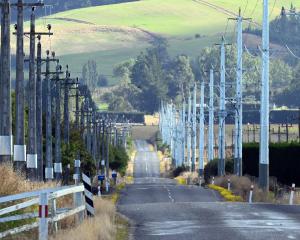As a farmer, I have been increasingly concerned by the lack of consistency regarding the Otago Regional Council's interpretation and resulting actions around the Resource Management Act.
We have seen farmers around the province prosecuted in the Environment Court for breaches under the RMA, such as effluent discharges which ''may enter water''.
That is the critical few words found in the RMA which most prosecutions are based on ('' . . . and may enter water'').
What that means is that the contaminant didn't necessarily enter water (river or stream) causing pollution, it just ''may'' have been able to enter water - and that's a big difference.
It's a bit like if traffic legislation was changed so that you could get a speeding ticket simply because you ''may'' speed.
Would you be happy to accept that just because the speedo on your car goes up to 180kmh, that you could be ticketed because you ''may'' end up speeding and be prosecuted accordingly?
Of course it's not always that simple. In some cases contaminants from farms do in fact enter water.
That cannot be condoned and, depending on other surrounding circumstances, Environment Court may be the appropriate course of action.
We recently had ORC boss Peter Bodeker in the newspaper, saying findings in recent dairy inspections in Otago were not good enough, with an unacceptable number of breaches, and strongly implying pending prosecutions.
This is all in a very challenging climatic season for farmers, but no excuses.
Let's compare on-farm breaches of the RMA with those in the urban sector.
In last Saturday's ODT, it was reported that, in Cromwell, 3500 litres of untreated waste entered Lake Dunstan.
The ORC determined no action was required.
Why, I hear you ask, is it OK for that to occur but unacceptable for farm waste to maybe enter water?
Queenstown over recent months/years has had numerous untreated spills into the lake, and not a single prosecution has eventuated to date.
Why is this allowed and the ORC deems it effectively acceptable, through no action?
Apart from the obvious major tourist destination image being tarnished by the sight of untreated sewage flowing on streets and into the lake, it is simply bad for the environment.
If Queenstown was a farm, there would be a huge public outcry for it to be shut down till major improvements could be completed bringing it up to best practice standards.
Other towns around Otago actually have consent to pollute on a daily basis.
Milton, for example, has been issued consent by the ORC to intermittently discharge 9150cu m per day of untreated wastewater mixed with stormwater to the Tokomairiro River.
This discharge permit expires on December 31, 2017.
But don't worry; part of the consent approval includes a diagram for a sign to be erected, saying ''Danger, Keep Out, No Swimming''.
Milton is just one example.
There are other towns throughout Otago which regularly discharge partially treated waste into rivers and our lakes under consent, and towns that regularly breach their discharge permits without consent.
The ORC monitors these situations but does nothing other than note the breaches and recommend a further consent be issued when the old one expires.
Other towns in Otago have consent to discharge their untreated and partially treated waste to land ''in a manner that may enter water''.
It is interesting a town could have this discharge consent approved by the ORC, when this is the same standard for which Otago farmers are being prosecuted, and the general public is being told is so bad.
Even as far as most coastal towns are concerned, the solution is simple - just put it out to sea (hello, Dunedin).
Well at least it doesn't get to fresh water that way, although it may close the beach on the odd occasion if the wind blows the wrong way.
It is one rule for council discharges, and a completely different rule for farmers.
I'm convinced the environment doesn't notice the difference, so why does the ORC?
To people living in our towns and cities, you have been ''sold'' a story comprising limited science backing based on a successful and catchy slogan, ''dirty dairy''.
And from that was born the misconception that most pollution is from farms.
Well . . . it must be true mustn't it?
Otherwise the ORC (and other regional councils around New Zealand) would be prosecuting towns and cities.
The ORC's ability to turn a blind eye to blatant urban pollution, both within discharge consent parameters and continual breaches with spills into our lakes and rivers, is beyond belief, especially given it is so keen to prosecute farmers at the same time.
Farmers don't expect any special treatment. We have a huge responsibility in looking after our environment.
But nor do we expect to be targeted and singled out by our governing regional council. Stephen Crawford, from Clydevale, is Otago dairy chairman of Federated Farmers.











